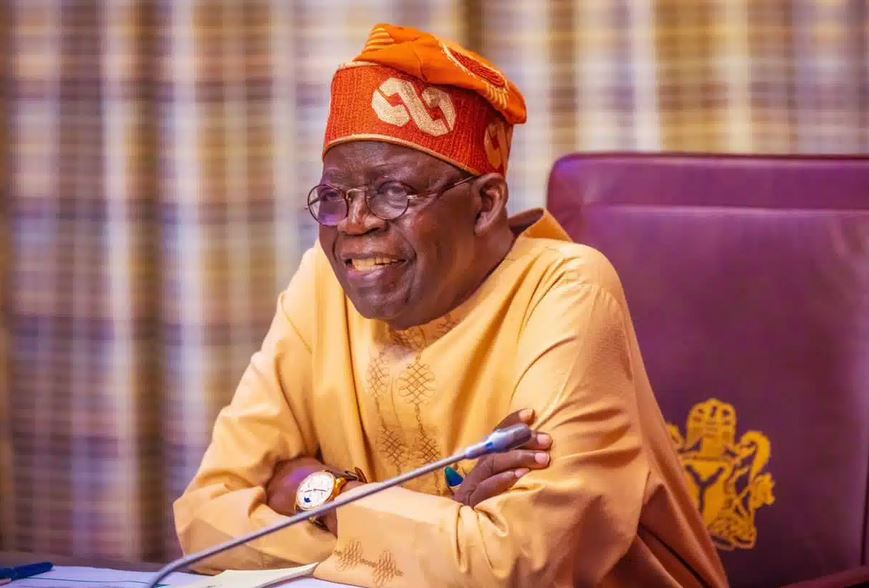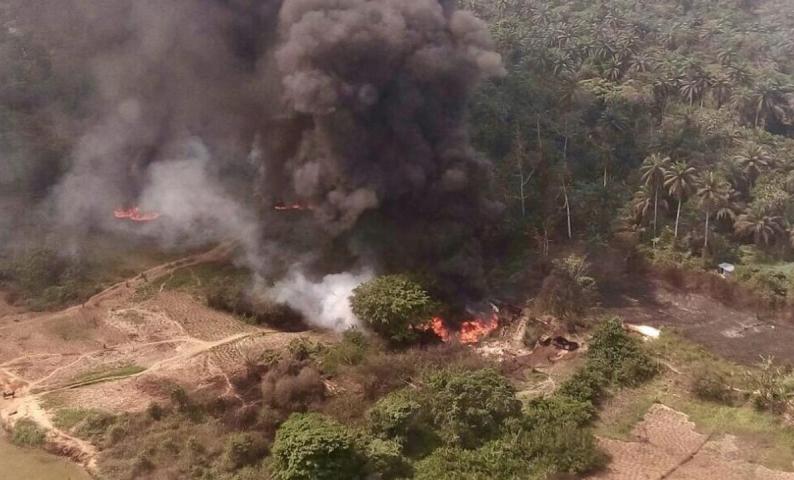COVER
Besides N41trn Public Debt, FG Owes CBN $47bn – Report

By Joseph Amah, Abuja
The federal government has confirmed that it was owing the Central Bank of Nigeria (CBN) N20 trillion ($47 billion), which is yet to be added to the country’s outstanding public debt, according to a report by the Budget Office of the Federation.
This is coming as a Think-Tank backed by the Bill & Melinda Gates Foundation is seeking $50 billion in aid to help debt-ridden African countries re-enter capital markets and avoid future defaults.
The debt figure was as of March 31, the Budget Office said, in a document, which gave the details of the country’s expenditure plans from 2023-2025.
The document was posted on the Budget Office’s website at the weekend.
Nigeria’s outstanding public debt is N41.6 trillion.This is even as Director General of the Debt Management Office, Mrs Patience Oniha raised the alarm that the nation’s high debt levels with a corresponding high debt service figures was a major constraint to further investments in the country’s deteriorating infrastructure.
Even with the additional obligations, the country remains “within Nigeria’s self-imposed” limit of 40 per cent debt to Gross Domestic Product (GDP), according to the report quoted by Bloomberg. The government plans to securitise its Ways and Means Advances (WMAs) from the CBN and revamp “it into a longer tenor amortising facility with a lower interest rate,” according to the Budget Office.
The country barely earned enough revenues to cover debt service payments in 2021, according to the budget office while in the first four months to April, government income of N1.63 trillion was less than the N1.94 trillion needed to cover debt-service payments, Minister of Finance, Budget and National Planning, Mrs Zainab Ahmed said, according to a presentation on the budget office’s website.
While the debt portfolio remains vulnerable to revenue and export shocks, “the challenges are being addressed by the government through its ongoing strategic revenue growth initiatives,” the report added.
Meanwhile, a think-tank backed by the Bill & Melinda Gates Foundation is seeking $50 billion in aid to help debt-ridden African countries re-enter capital markets and avoid future defaults.
The amount is an “average estimate,” said the President of the Paris-based Finance for Development Lab, which was launched last month, Daniel Cohen. Cohen, who is also President of the Paris School of Economics, said the money would be used to “enhance” credit quality by providing guarantees and helping African commodity exporters and importers hedge against price volatility.
Some African countries, which hit capital markets as global interest rates plunged to a record low, are on the verge of default due to the economic impact of the COVID-19 pandemic and Russia’s invasion of Ukraine, Bloomberg reported.Sovereign dollar bonds from African countries trade on average at 1,007 basis points above the US Treasury yield, meeting the widely accepted definition of a debt crisis.
The laboratory, which develops the proposals and wants an established body to hold the facility, includes representatives from the Steering Committee of the United Nations Economic Committee for Africa and think tanks from Santiago and Accra to New Delhi. World Trade Organisation (WTO) Director-General Ngozi Okonjo-Iwela attended its launch, the report said.
The Gates Foundation provided $2.6 million in September 2021 to start the project, the Bloomberg report recalled.
“Last year, we interacted with passionate thinkers from the Paris School of Economics who brought new ideas and energy to the funding debate – from Francophone Africa to the Paris Club to the private sector,” the foundation said in a response to questions.
“We jointly thought of a new organisation with the vision of creating an engaged community of think tanks and research centres that could help provide innovative, yet practical and evidence-based proposals meeting today’s financial challenges,” it added.
Cohen said he had begun talking to politicians, including French leaders, about contributions to the fund, noting that the contribution could come in the form of International Monetary Fund (IMF) special drawing rights.
The lab is proposing rolling interest-payment guarantees and loan-restructuring and facilitation facilities to provide cash “sweet” to creditors to cut the length and cost of restructuring negotiations, a document said.
Cohen said such a mechanism is necessary to help countries re-enter the market.
“Either they are locked out of the market or they can re-enter, provided they are enhanced by some sort of guarantee. Such a mechanism would be needed to restore access to the market. There will be a lot of restructuring in the coming years. Some cash can be a big advantage,” Cohen stressed.
The alternative is that countries locked out of capital markets will have to rely on grants and multilateral development banks for their financial needs, he explained.
The lab is also offering protection against commodity volatility by guaranteeing margin call payments triggered by rising prices, explaining that the laboratories also plan to develop relationships with Chinese academics as many African countries are indebted to China.
“We are thinking of a parallel group of Chinese scholars thinking about the role of China’s main creditor in Africa,” he said.
High Debt Weakening Investment in Infrastructure –DMO
.
The DG, Debt Management Office position was contained in a document presented during a workshop for civil society organisations organised by the SFTAS programme coordination unit held in Abuja entitled, ‘Why Debt Sustainability Is Important at the Subnational Level in Nigeria: Challenges and Prospects’ and a copy of it was obtained DAILY ASSET.
According to the DMO DG, “High debt levels lead to heavy debt service which reduces resources available for investment in infrastructure and key sectors of the economy.”
In the document, she stressed the need for debt sustainability, which she defined as the ability to service all current and future obligations, while maintaining capacity to finance policy objectives without resort to unduly large adjustments or exceptional financing such as arrears accumulation, debt restructuring, which could otherwise compromise its stability.
She added that, “A country’s public debt is considered sustainable if the government is able to meet all its current and future payment obligations without recourse to exceptional financial assistance or going into default.”
However, despite the high debt service, the DMO has constantly insisted on the sustainability of Nigeria’s rising debt, using the debt to Gross Domestic Product ratio as justification.
The International Monetary Fund (IMF) had earlier warned that debt servicing might gulp 100 per cent of the Federal Government’s revenue by 2026 if the government failed to implement adequate measures to improve revenue generation.
According to the IMF’s Resident Representative for Nigeria, Ari Aisen, based on a macro-fiscal stress test that was conducted on Nigeria, interest payments on debts might wipe up the country’s entire earnings in the next four years.
Aisen said, “The biggest critical aspect for Nigeria is that we have done a macro-fiscal stress test, and what you observe is the interest payments as a share of revenue and as you see us in terms of the baseline from the federal government of Nigeria, the revenue of almost 100 per cent is projected by 2026 to be taken by debt service.
“So, the fiscal space or the amount of revenues that will be needed and this without considering any shock is that most of the revenues of the federal government are now, in fact, 89 per cent and it will continue if nothing is done to be taken by debt service.”
However, The Minister of Finance, Budget and National Planning, Dr Zainab Ahmed, recently disclosed that Nigeria’s debt service cost surpassed its revenue in the first four months of this year.
Debt service gulped N1.94tn between January and April 2022, against a retained revenue of N1.63tn.
A copy of the public presentation of the 2022 approved budget by the finance minister showed that the Federal Government allocated N3.32tn for debt servicing in 2021.
However, the minister’s presentation document showed that a total of N4.2tn was spent on debt servicing in 11 months, indicating a difference of N1.15tn or 37.9 per cent of the money allocated for debt servicing for the period.
In October last year, the finance minister, during an interview with Bloomberg TV, said, “Our debt service to overall revenue is high because we have a very large expenditure base. We have a large proportion of our budget dedicated to payroll, and Mr President had decided from the beginning of his administration that we were not going to disengage staff.
“So, you have to pay salaries, you have to pay pensions. And also, we have to fund the other arms of government, which are the judiciary and the legislature.”
COVER
APC Govs, NASS, Party Leaders Adopt Tinubu for 2027 Presidential Poll

By David Torough, Abuja
The 22 All Progressives Congress (APC) governors yesterday adopted President Bola Tinubu as the sole presidential candidate of the party for the 2027 general elections.This was even as the leaders of both the Senate and the House of Representatives expressed their full support for Tinubu’s second term, stating that the country is currently on a path of growth and progress.
The Progressives Governors’ Forum (PGF’s) Chairman and governor of Imo State, Sen. Hope Uzodimma, spoke on behalf of all the governors at the National Summit of APC at the Banquet Hall of the State House, Abuja.The governors also passed a vote of confidence in President Bola Tinubu.The Vice Chairman of the PGF and Governor of Kaduna State, Senator Uba Sani, joined Governor Uzodimma on the podium to second the motion for the adoption of the President as APC presidential candidate for 2027 poll.Thereafter, Uzodimma put the motion to vote before the participants at the National Summit.Those present were Vice President Kashim Shettima; Senate President, Godswill Akpabio; members of the National Assembly; serving and former governors, and APC members from across the 36 states and the Federal Capital Territory.They, through voice vote and standing ovation, adopted President Tinubu for a second term in office come 2027.Uzodimma said the governors were united in their support for Tinubu’s re-election bid.He said: “That for Nigeria to get to her destination faster in prosperity, that the president should be used and adopted as our flag bearer for the 2027 presidential election, for a second term in office.“That the governors produced by our All Progressives Congress are hereby charged to take responsibility to market our federal government policies, occupy the political space in their domains, and take responsibility for winning all elections in their states come 2027.“It is therefore my humble pleasure, with total humility, to Almighty God to move that this August assembly adopt and concur the position of progressive governors that Mr President carries our flag 2027 and governors take responsibility for delivering this mandate. I’m so move as a motion.”Governor Sani seconded the motion: “I rise to second the motion as ably moved by the chairman of Progressives Governors Forum, the governor of Imo state, His Excellency, Hope Uzodimma, that this August gathering pass a vote of confidence on our able and amiable president, President Bola Ahmed Tinubu, as a sole candidate of APC come 2027 general election.NASS Leadership Endorses Tinubu for 2027 ElectionThe leaders of both the Senate and the House of Representatives have expressed their full support for President Bola Tinubu’s second term, stating that the country is currently on a path of growth and progress.Senate President Godswill Akpabio, who moved the motion on Thursday during the APC National Summit at the State House banquet hall in Abuja, acknowledged that the 2023 election posed significant challenges for President Tinubu.Joined by the Speaker of the House of Representatives, Tajudeen Abbas, Deputy Senate President Barau Jibrin, and Deputy Speaker Benjamin Kalu, among others, Akpabio expressed optimism about the future.He predicted that Tinubu would secure even more states in the 2027 elections, stating that he sees a clear shift in momentum in the President’s favour.Akpabio remarked that despite the challenges, President Tinubu is actively working to reposition Nigeria.The Senate President stated that with opposition parties, particularly the PDP, in disarray, President Tinubu should be re-elected in 2027 as the sole candidate.Akpabio’s position was fully supported by other National Assembly leaders, with no dissenting voices.APC Endorses Tinubu for 2027 Presidential RaceThe All Progressives Congress has endorsed President Bola Tinubu as its flag bearer in the 2027 presidential elections.The Party’s National Chairman, Dr. Abdullahi Ganduje, announced this yesterday, on behalf of its National Working Committee, at its National Summit held at the State House Banquet Hall, Abuja.The endorsement came hours after APC governors and lawmakers cast a vote of confidence on the president and endorsed him for a second term.‘Sweep them Clean,’ Bring More Opposition Members – TinubuPresident Bola Tinubu has welcomed the gale of defections in the ruling All Progressives Congress, saying he expects more opposition party members to join his party.The President said this at the APC National Summit on Thursday in Abuja.In his speech, the President said he is happy about the wave of defections into the APC and urged the ruling party’s leadership to bring in more opposition members.President Tinubu also slammed critics who accused his government of installing a one-party state due to the recent gale of defections. He said those defecting to the APC should not be blamed because they were in a sinking ship.The President said, “You don’t blame people bailing out of a seeking ship, when they have no life jacket. I am glad of what we have and I’m expecting more to come. That’s the game. We are in a constitutional democracy; don’t forget the freedom of movement and freedom association is not criminally punishable. Welcome to the progressives, sweep them clean.”Earlier, the APC National Working Committee members led by the party’s National Chairman, Abdullahi Ganduje, endorsed President Tinubu for a second term.The endorsement followed the National Assembly’s declaration of support for the President as their sole candidate for the 2027 presidential election.Sen. Godswill Akpabio, the President of the Senate, moved the endorsement, which was seconded by Hon. Tajudeen Abass, the Speaker of the House of Representatives.Defect with Me to APC or Resign, Gov Eno Tells Commissioners, OthersAkwa Ibom State Governor, Pastor Umo Eno, has directed all commissioners and political appointees in his cabinet to either defect with him to the All Progressives Congress, APC, or resign from their positions.The directive was reportedly issued during an ongoing State Executive Council (EXCO) meeting on Thursday, where the governor openly confirmed his decision to leave the People’s Democratic Party, PDP, for the APC.Sources present at the meeting disclosed that Governor Eno made it clear that his defection should come as no surprise to any of his appointees, stating:“Anybody who claims he is not aware of my intention to leave the PDP is still living in the 18th century,” he said.He explained that his decision to align with the APC was driven by his admiration for the leadership style of President Bola Tinubu, adding that he wants to work more closely with the Federal Government.The governor issued a stern warning to his appointees, saying he has “nothing to negotiate” with anyone unwilling to follow his political direction.“Apart from elected officials like House of Assembly members and Local Government Chairmen, I have nothing to negotiate with you,” Eno declared.“Let me tell you, anybody who believes that when I leave the PDP he will use the party structure to fight me is lying, because I will still control the PDP structure.”As of the time of filing this report, the State Executive Council meeting was still in session, with further developments expected in the coming hours.Nigerian Voters, not Govs ‘ll Decide Tinubu’s Fate in 2027 – WabaraOn the contrary, former Senate President and the Chairman Board of Trustees, BoT, of Peoples Democratic Party, PDP, Senator Adolphus Wabara, has said that the Nigerian electorate, and not a few governors, will decide the fate of President Bola Tinubu in 2027.Senator Wabara was reacting to the adoption of Tinubu by APC governors as their sole candidate for the 2027 presidential race.However, he commended the governors for giving the President the right of first refusal, which he acknowledged “is a global practice and tradition”. But he added that being the flag bearer of the ruling party does not translate to automatic victory at the pool.Senator Wabara recalled that in 2015, PDP’s presidential flag bearer, President Goodluck Jonathan, was a sitting President but lost to the then opposition APC’s candidate.The former Senate President told the APC governors to allow President Tinubu’s work to speak for him.He said that the Nigerian masses “Who on a daily basis, feel the impact of the APC-led Federal Government, are the only ones to decide the President’s fate in 2027”.The PDP BoT Chairman argued that “it’s too early to overheat the polity with 2027 elections when INEC has not lifted the ban on campaigns.He “advised APC governors to rather concentrate on how to make life affordable for Nigerians, who are battling to survive the hardship inflicted on them by APC’s maladministration”.The former Senate President accused the APC of foisting one party system on Nigeria. He warned of the grave danger such drifting poses to the country’s democracy.COVER
Renewed Herdsmen Attacks Kill Two Soldiers, Two Villagers in Benue

From Attah Ede, Makurdi
Gunmen suspected to be armed herdsmen have reportedly killed four persons, including two soldiers in a renewed attack on a community in Apa Local Government Area of Benue State.The latest attack had led the residents to flee to Ugbokpo headquarters of Apa LGA where they are taking refuge.
Some locals who spoke to DAILY ASSET yesterday identified the attacked communities as Ikobi which is located just a few kilometres away from Ugbokpo, the headquarters of Apa local government area. According to residents, the incident happened on Wednesday at about 3:30AM when the assailants invaded the community in a commando style, ambushing the soldiers who were conducting surveillance in the area and allegedly killing two of them.An eyewitness, who spoke on condition of anonymity, told DAILY ASSET through text message on Thursday that “The herdsmen, yesterday (Wednesday) attacked and killed four persons including two soldiers and made away with the military’s two AK47 and one SMG Gun, at Ijaha Ikobi, in Apa Local Government Area of Benue”.He gave the names of the civilian victims (Natives), who were killed to include; Ocheje Ngbede Sani and Aduba Paul Ogboyi, while names of the two soldiers killed as at the time of filing this report, were yet to be unknown.He lamented that the current security situation in Benue State called for concern of everyone and the entire Nigeria.The source insisted that both military and other paramilitary ought to have taken over the whole surrounding bushes in Apa and Agatu, to clear the insurgents and free the areas for farmers to farm peacefully.”This is a wakeup call to “Mopol 80″ stationed at Odugbo, to rise up to their responsibilities and face the criminal herders headlong and clear the bushes in Apa and Agatu axis and even other parts of zone C. Enough is enough! No one has a monopoly of violence”, he said.”We pray for the souls of the innocent farmers and Gallant Officers who were killed at Ijaha Ikobi in Apa and the souls of others, rest in peace Amen,” he added.Council’s chairman of Apa local government, Adam Ochega Ogwola confirmed the incident to newsmen in Makurdi on Thursday, describing the killing of the soldiers and innocent civilians as quite disturbing.”Yes, I can confirm that two soldiers and two other civilians were killed by herders.”At about 3:30am yesterday I received a call that there was an attack in the Ikobi community and when I called some people, there was no response from them. Later I heard that two soldiers were killed. So this morning, they discovered the bodies of the two civilians.”The attack took place at Ikobi community in Apa. The situation is relatively calm now. Soldiers and police are there to carry out their investigation to ensure that normalcy returns to that community.”Because of the culture of our people, you don’t normally keep accidental dead bodies in the mortuary. We are in the period of hit and run herders. When it happens we may not allow the corpse(s) to stay beyond 24hrs. So, they have been buried while the bodies of the late soldiers have been moved from that community. But I don’t know whether they are in a mortuary in Ugbokpo or in a mortuary in Makurdi”, the chairman stated.Effort to get confirmation from the Benue State Police Command proved abortive as the spokesperson for the command, Catherine Anene could not respond to calls and texts messages as at the time of filing this report.COVER
Again, Dangote Refinery Slashes Petrol Prices Nationwide

By Tony Obiechina, Abuja
The Dangote Petroleum Refinery has announced a fresh cut in the pump prices of Premium Motor Spirit (petrol) nationwide.The new rates now range from N875 to N905 per litre, depending on location.A breakdown of the revised prices shows, Lagos: N875, South-West N885, North-East: N905, North-West & Central: N895, and South-South & South-East: N905Prices indicate a N15 reduction per litre across all regions and partner retail outlets, applying to all major fuel marketers in partnership with the refinery, including MRS, Ardova, Heyden, Optima Energy, Techno Oil, and Hyde Energy.
Before the new price template, Lagos residents paid N890 per litre, while prices rose to N920 in the North East and South-South regions.Lagos residents will now pay N875, while those in the North East and South South will pay N905 per litre with the new adjustments.“Our quality petrol and diesel are refined for better engine performance and are environmentally friendly,” the company stated in the notice.The development comes after the 650,000 Lekki-based refinery on Monday said the naira-for-crude deal allowed it to reduce the price of petrol at the pumps.In a statement signed by its Group Chief Branding and Communications Officer, Anthony Chiejina, the company said the decision to maintain price stability reflects its unwavering commitment to supporting the Nigerian economy and alleviating the burden on consumers from the increase in fuel prices by maintaining price stability.The company affirmed that the prices of petrol will remain affordable and stable.

























